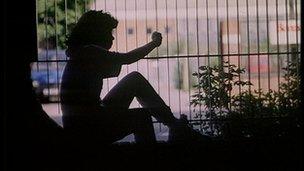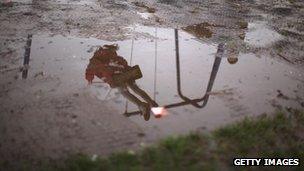Are some children's homes putting profit before child protection?
- Published

The annual cost of looking after 5,000 children living in residential care homes in England is around £1bn
This week the government delivered scathing criticism of residential children's homes in England. Radio 4's <link> <caption>The Report</caption> <url href="http://www.bbc.co.uk/thereport" platform="highweb"/> </link> reveals that some of the private companies running these homes have reaped big profits in recent years, and asks are they putting profit before child protection?
Children's homes - like the care industry as a whole - have undergone radical reform over the past couple of decades, where the provision of care has shifted from local authorities to private companies.
Private companies now run 75% of children's homes in England and in recent years, some of the bigger players expanded significantly, with one running over 100 homes across the country.
At present, the total cost of caring for around 5,000 young people living in residential care homes currently runs at around £1bn per year - caring for society's most vulnerable children is not cheap, and for good reason. But is this money being well spent?
"There are some very fine private sector organisations, who try very hard," says Charles Sharpe, who has spent 40 years working in the care sector.
"But where I struggle with the private sector is that in the good years, they can be good, but when the bad years come they have to scrimp and use less experienced staff and cut all sorts of corners," he tells Radio 4's <link> <caption>The Report</caption> <url href="http://www.bbc.co.uk/thereport" platform="highweb"/> </link> .
"Child care for me is something that should never be done with a profit motive."
However, it would appear that child care in England can prove very lucrative indeed.
There has been little analysis of this sector's growth, but research conducted in 2006 reported that the top five children's home providers in England made a pre-tax loss of £3.5m.
Figures compiled by Radio 4's The Report show that in 2011, the top five providers had turned a profit of £30m. I asked to speak to the management of three of these companies, but they all declined my request.
Private equity ownership
Many of the larger companies providing care are owned by private equity firms, which have links to long-term investment schemes, such as pension funds. This has not gone unnoticed by the government.

There is a high concentration of children's homes in the north-west of England.
"It would be crazy not to notice that there's been an increasing move into this market by private equity funds over recent years," says minister for children Tim Loughton.
"We need to make sure they are there for the right reasons, that they are providing a consistently good quality of care and expertise for the children who need it," he told the BBC.
Children's homes providing such care can charge up to £250,000 per year, per child - depending on the degree of support a child needs.
Sitting at the computer of MP Ann Coffey, head of the parliamentary group on missing children, she shows me an advert placed online by a children's home - one she knows has had problems with children running away:
"Homes are advertising very aggressively for children who are very damaged, who have histories of drug abuse, sexual abuse, alcohol abuse," she says.
She has been campaigning for many years about the poor quality of some children's homes, and is concerned about the way some actively "recruit" the most troubled children - possibly because they earn the highest fees.
"These homes are not offering to provide the resources to support that child," she says, "they're simply stating that they will accept these children. They expect the local authority in their area to provide the resources."
This means despite an already significant outlay by local authorities who pay fees to the homes, there could be additional costs to the NHS, schools and the police who have to respond to, say, anti-social behaviour incidents involving children who should be in the care of a home.
Cutting corners?
The Chief Constable of Greater Manchester Police Peter Fahy knows this too well - the north west of England has the highest concentration of children's homes in the country:
"We have had instances where young people go missing - sometimes hundreds of times," he says.
"If that person has been found, the children's home has minimal staffing and they can't release a member of staff to collect the child, and then they ask us to do the collection. It's not really our job... but we are the 24 hour service of last resort."
Dealing with missing children from residential homes is estimated to cost police in England £40m a year.
However, homes are not reaping big profits by cutting corners and passing the costs on to other parties, says Jonathan Stanley, chief executive of the Independent Children's Homes Association.
"The majority are small and solo providers [and] analysis of the current accounts of providers would tend to suggest that the levels of profits remain very low - in fact the return on investment is becoming a concern," he says.
Balancing the books is a daily struggle for the manager of one London home, I spoke to, which is currently caring for six teenagers. He tells me local authority cuts is why he has had to cut corners - not the search for higher profits.
Lowering staff wages has been one way he has managed to reduce overheads - and this, inevitably, has had an impact on the quality of care:
"Obviously, if you're paying low wages, you'll attract low quality people and we should really be looking at better qualified people to do a complex, difficult task," he says.
"You need proper qualified, motivated people... and if you're talking about how difficult these children are, how traumatised they are, why are we not getting the best people to work with them?"
The Independent Children's Homes Association says standards of care throughout the sector are high. It points to the fact that Ofsted, which is responsible for inspecting children's homes, found only 2% of homes were inadequate - although Ofsted's inspection criteria has recently been reviewed, and this figure is expected to jump significantly when new figures are published later this year.
And as the government announced this week, there will be a more far-reaching review of the whole children's home sector - including the involvement of private equity firms:
"I want the whole market of children's homes to be looked at rather more closely," says children's minister Tim Loughton, "because at the end of the day the most important thing is to make sure we have the best care for vulnerable children."
<bold>Hear more on this story on </bold> <link> <caption>The Report</caption> <url href="http://www.bbc.co.uk/programmes/b00jkr1q" platform="highweb"/> </link> <bold> on </bold> <link> <caption>BBC Radio 4</caption> <url href="http://www.bbc.co.uk/radio4" platform="highweb"/> </link> <bold> Thursday 5, June at 20:00 BST. </bold>
<bold>You can listen again via the Radio 4 </bold> <link> <caption>website</caption> <url href="http://www.bbc.co.uk/programmes/b01kbld7" platform="highweb"/> </link> <bold> or by downloading The Report </bold> <link> <caption>podcast</caption> <url href="http://www.bbc.co.uk/podcasts/series/r4report" platform="highweb"/> </link> <bold>. </bold>
- Published4 July 2012
- Published3 July 2012
- Published31 May 2012